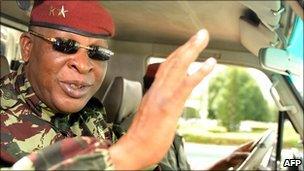Guinea's presidential elections 'postponed'
- Published

Presidential elections in Guinea have been postponed because of a lack of preparation, say officials.
The move comes hours after military ruler Gen Sekouba Konate said he was committed to holding the run-off, which was scheduled for Sunday.
Gen Konate had been due to meet the two candidates in the presidential vote.
The preparations had been thrown into doubt by violence sparked by the fraud conviction of two senior election officials.
The postponement announcement came after a meeting between interim Prime Minister Jean-Marie Dore and the two candidates, Cellou Dalein Diallo and Alpha Conde, the AFP news agency reports.
"We need two weeks to prepare well," said Independent National Electoral Commission (Ceni) spokesman Thierno Ceydou Bayo.
Foumba Kourouma, a member of Ceni, told Reuters the commission would meet candidates on Thursday to set a new date.
The first round of the elections was seen as Guinea's first democratic vote since independence in 1958, raising hopes of an end to military and authoritarian rule in the mineral-rich country.
The BBC's Alhassan Sillah, who is in the capital, Conakry, said it was difficult to see how the elections could be held on Sunday, as a lot of logistical work still had to be done, such as transporting election materials to remote areas.
The head of Ceni, Ben Sekou Sylla - who was one of those sentenced to a year in jail - died on Tuesday after an unspecified long illness.
Bias accusations
Gen Konate was expected to make a broadcast to the nation on Wednesday night.
He has not spoken in public since the weekend violence, in which at least one person died.
But on Tuesday night, the minister for presidential affairs said Gen Konate remained committed to handing power to an elected, civilian government.
All campaigning has been suspended following the clashes.
Mr Dore said on Monday that public order was more important than holding the elections as planned.
Those remarks led to accusations by the party of one of the candidates - former Prime Minister Cellou Dalein Diallo - that Mr Dore was biased.
Mr Diallo's Union of Democratic Forces in Guinea (UDFG) has called on Mr Dore to resign "in the interests of a trouble-free election".
Mr Diallo is seen as the favourite after gaining 44% of first-round votes, but his rival, veteran opposition leader Alpha Conde, says he was defrauded of some 600,000 votes in that poll.
His complaint led to the conviction of Mr Sylla and one of his senior officials.
Mr Sylla died in France, where he had been undergoing medical treatment for several months. He went back to Guinea for the first round of voting before continuing his treatment in Paris.
Ahead of the run-off poll, tension is reported to be growing between ethnic Peul and Malinke - the two largest communities in the country.
Mr Diallo, a Peul, gained 44% of the first round votes, compared with 18% for Mr Conde, a Malinke.
A member of the Peul ethnic group has never been president and many feel it is their turn after previous elections were rigged.
The Malinke are heavily represented in the ruling military junta, which seized power after the death in 2008 of autocratic President Lansana Conte, who had ruled the country for 24 years.
Guinea is the world's largest exporter of the aluminium ore bauxite and also has important deposits of iron ore.
But despite its mineral wealth, most of its people languish in poverty.
- Published25 June 2010
- Published25 November 2009
- Published9 February 2011